| |
2023 IEEE Computational Intelligence Society Election is Now Open- VOTE by 8 November
The IEEE Computational Intelligence Society election of Members-at-Large to the Administrative Committee is now open.
We hope you will take the time to exercise your vote and help choose the future direction of the Society. Let’s increase last year’s voting percentage of 14.6% by voting today! Your vote counts!
VOTE NOW at https://eballot.app/ieee
|
| |
|
| |
IEEE CIS Engages in IEEE Africon 2023
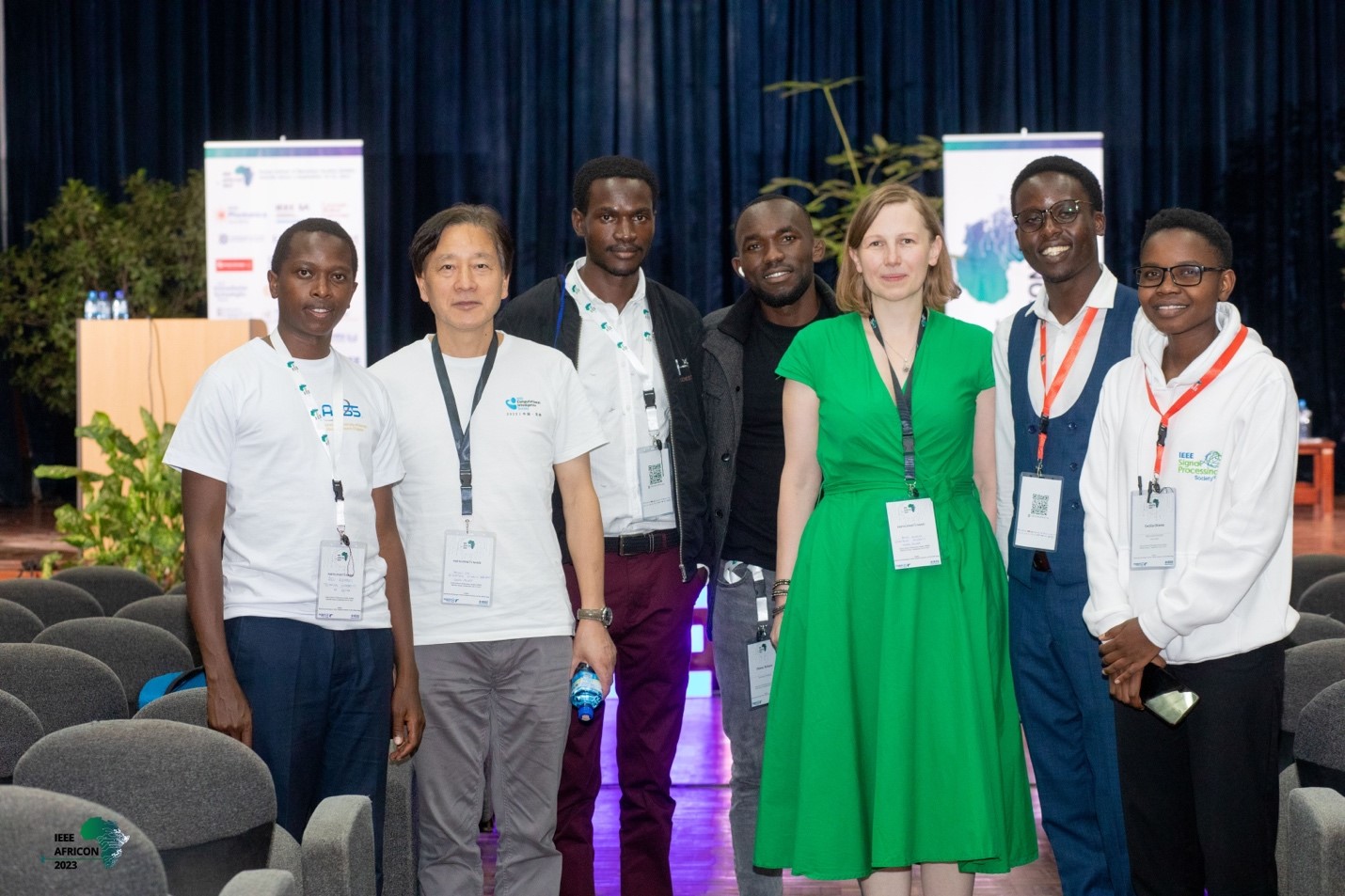
On 21 September 2023, IEEE Computational Intelligence Society presented itself to participants of IEEE Africon 2023, Nairobi, Kenia, in IEEE CIS Awareness Session. Prof. Yaochu Jin (University of Bielefeld, Germany), President-Elect of IEEE CIS, and Prof. Anna Wilbik (Maastricht University, The Netherlands), chair of Fuzzy Systems Technical Committee, introduced the Society.
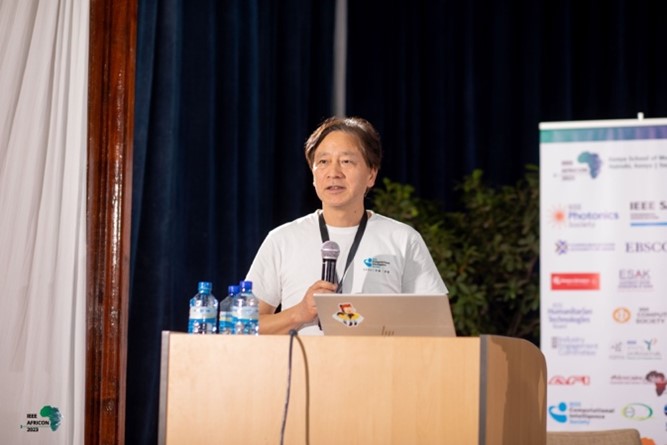
During an interactive session, the IEEE CIS structure and member activities, such as conferences, webinars, and distinguish lecture program, were presented to the participants. Special attention was devoted to the Mentoring Program and Paper Development Workshop held at our flagship conferences. We discussed the barriers and opportunities for further engagement, such as bringing Mentoring Program "on tour."
The session revealed a big interest in Computational Intelligence and AI research domain, as well indicated that there is a huge opportunity and willingness for future activities. This activity is part of the Breaking Boundaries initiative, sponsored by IEEE CIS. Breaking Boundaries seeks to revitalize the community building activities, which were lost in recent years, largely due to the COVID pandemic.
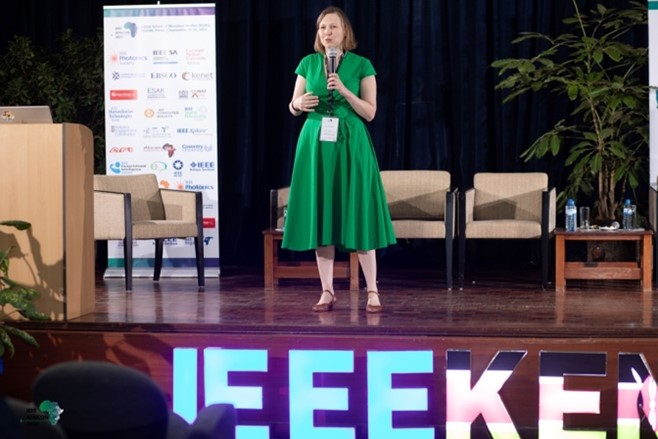
Breaking Boundaries initiative was proposed and is led by Anna Wilbik (Maastricht University), Christian Wagner (University of Nottingham), Jon Garibaldi (University of Nottingham) and Luis Magdalena (Technical University of Madrid).
|
| |
|
| |
2023 Wiley-IEEE Press Professional Book Award
Congratulations to author Robert G. Reynolds, the recipient of the 2023 Wiley-IEEE Press Professional Book Award for the book "Cultural Algorithms: Tools to Model Complex Dynamic Social Systems."
The book is in the IEEE Press Series on Computational Intelligence and is sponsored by the Computational Intelligence Society.
|
| |
|
| |
Call for Associate Editors for IEEE TAI
Applications close 3 December 2023. Successful applicants will be notified by early 2024.
|
| |
|
| |
A Sandbox for Teaching and Learning in CI for Pre-University and Undergraduate Students at IEEE CEC 2023 and FUZZ-IEEE 2023
More than 150 students, teachers, and parents, both in-person and online, took part in these events on 2 July at IEEE CEC 2023 and 13 August at FUZZ-IEEE 2023. Participants were from Taiwan, Japan, Germany, Hong Kong, the USA, Korea, and India.
The event was organized by Chang-Shing Lee, Guilherme N. DeSouza, Alexander Dockhorn, Yusuke Nojima, Marek Reformat, Li-Wei Ko, and Chun-Rong Huang. It was supported by the IEEE CIS Education Portal Subcommittee and Task Forces on Competitions & Web Intelligence of IEEE CIS Fuzzy Systems Technical Committee.
For full report please visit here.
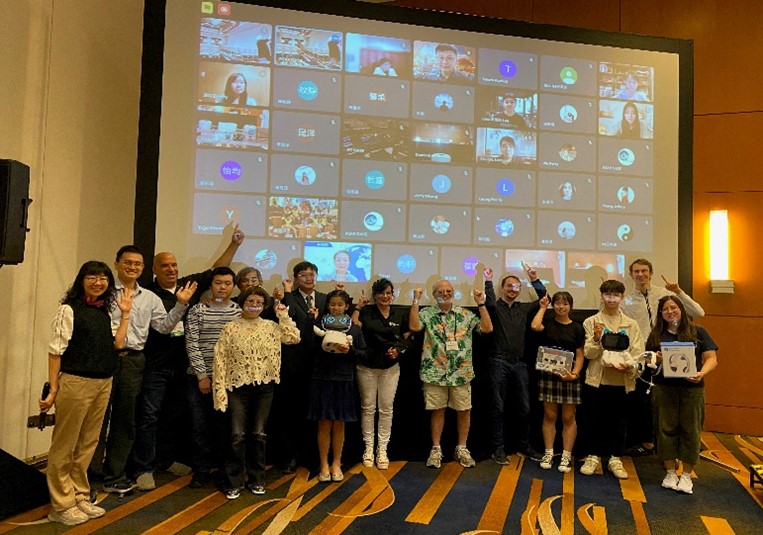
Participants attending the opening ceremony together with Jim Keller (IEEE CIS President) at IEEE CEC 2023 in the USA on 2 July 2023
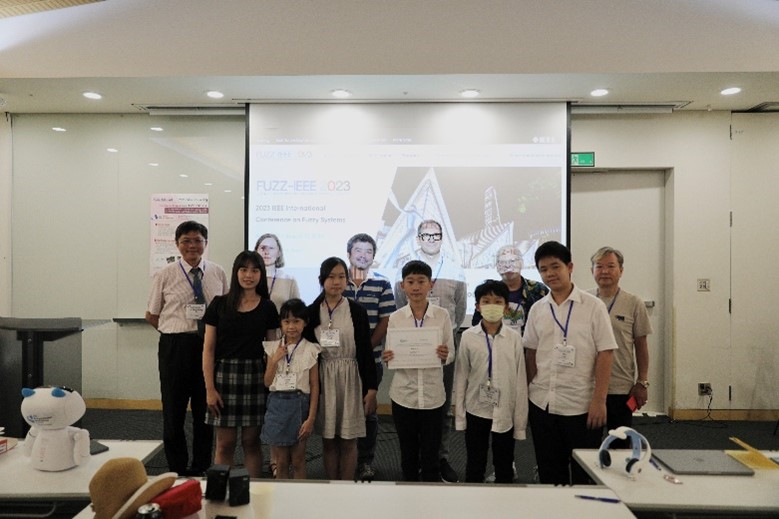
Winner of Elementary School Group at FUZZ-IEEE 2023 on 13 August 2023.
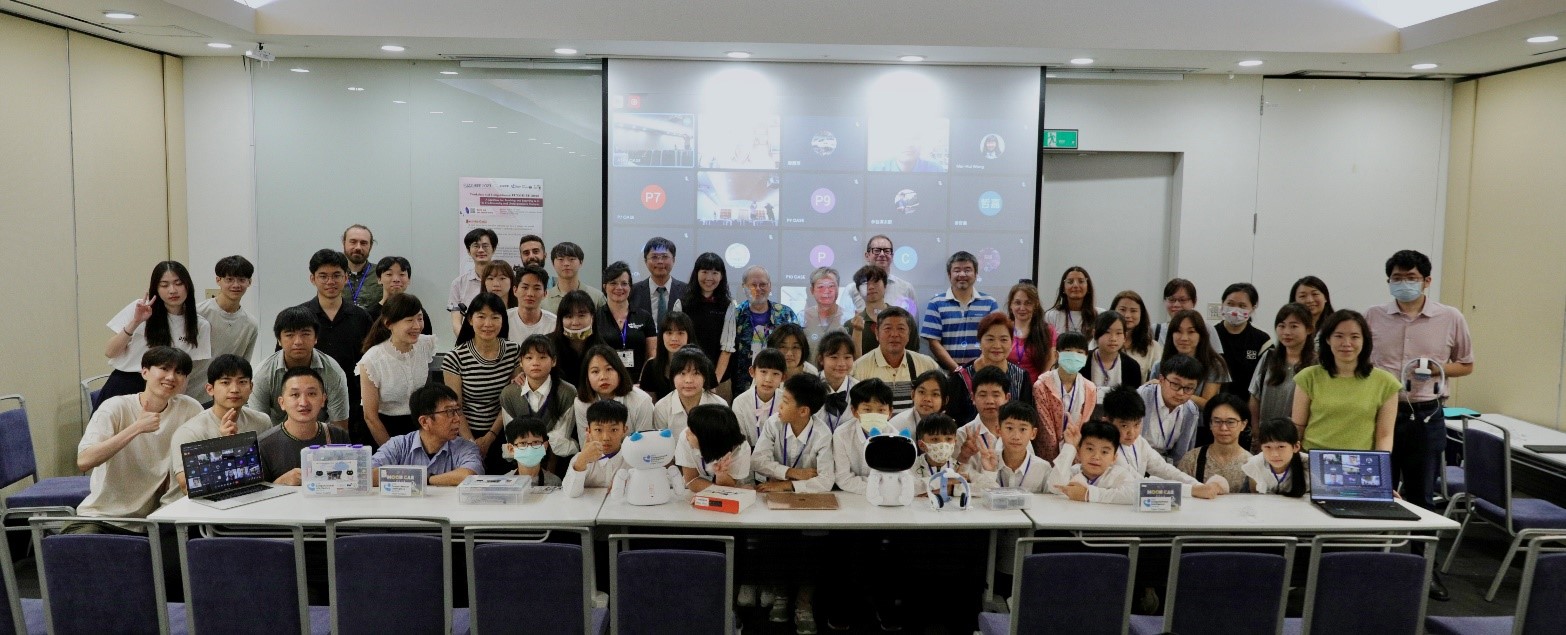
Participants attending the opening ceremony together at FUZZ-IEEE 2023 in Korea on 13 August 2023.
|
| |
|
| |
2024 IEEE CIS Student Grand Competition on Computational Intelligence in Biomedicine and Healthcare

We welcome participants to present computational intelligence solutions for core issues in smart medicine, smart healthcare, and smart hospital including but not limited to personalized, predictive, preventive, and participatory medicine and healthcare solutions. In the preliminary contest, the judge committee will select 10 teams based on the uploaded proposals. In the final contest, the selected teams need to physically or virtually attend the 2024 IEEE World Congress on Computational Intelligence (WCCI) in Japan for real-time demonstration and presentation of their systems.
Prize per team:
- 1st Place Award: US$1,500 + Certificate
- 2nd Place Award: US$1,000 + Certificate
- 3rd Place Award: US$600 + Certificate
- Honorable Mention: Certificate
Website: https://sites.google.com/view/cishackathon
Submission Due: 31 October 2023
Preliminary Contest: 3 January 2024
Final Contest: 30 June 2024
|
| |
|
| |
A Multi-Factorial Evolutionary Algorithm With Asynchronous Optimization Processes for Solving the Robust Influence Maximization Problem

The complex network has attracted increasing attention and shown effectiveness in modeling multifarious systems. Focusing on selecting members with good spreading ability, the influence maximization problem is of great significance in network-based information diffusion tasks. Plenty of attention has been paid to simulating the diffusion process and choosing influential seeds. However, errors and attacks typically threaten the normal function of networked systems, and few studies have considered the influence maximization problem under structural failures. Therefore, a quantitative measure with a changeable parameter is first developed in this paper to tackle the unpredictable destruction percentage on networks. Read more
IEEE Computational Intelligence Magazine, August 2023
|
| |
|
| |
Variational Reinforcement Learning for Hyper-Parameter Tuning of Adaptive Evolutionary Algorithm

The performance of an evolutionary algorithm (EA) is deeply affected by its control parameter's setting. It has become a trend in recent studies to treat the control parameter as a random variable. In these studies, the associated distribution of the control parameter is updated at each generation and new parameter setting is sampled from the distribution. The distribution's parameter (called hyper-parameter) is thus critical to the algorithmic performance. In this paper, we propose a variational learning framework to tune the hyper-parameters of EA, in which the expectation-maximization (EM) algorithm and a reinforcement learning algorithm are combined. Read more
IEEE Transactions on Emerging Topics in Computational Intelligence, October 2023
|
| |
|
| |
Partial Multilabel Learning Using Fuzzy Neighborhood-Based Ball Clustering and Kernel Extreme Learning Machine

Partial multilabel learning (PML) has attracted considerable interest from scholars. Most PML models construct objective functions and optimize target parameters, which add noise to the training process and results in a poor classification effect. In addition, feature correlation is limited to linear transformations while ignoring the complex relationships among features. In this study, we develop a novel PML model with fuzzy neighborhood-based ball clustering and kernel extreme learning machine (KELM). To reduce the interference from noise, ball k -means clustering is introduced to preprocess partial multilabel data and initialize ball clustering. A new ball clustering model based on fuzzy neighborhood is first designed to address partial multilabel systems. Read more
IEEE Transactions on Fuzzy Systems, July 2023
|
| |
|
| |
Gene Targeting Differential Evolution: A Simple and Efficient Method for Large-Scale Optimization

Large-scale optimization problems (LSOPs) are challenging because the algorithm is difficult in balancing too many dimensions and in escaping from trapped bottleneck dimensions. To improve solutions, this article introduces targeted modification to the certain values in the bottleneck dimensions. Analogous to gene targeting (GT) in biotechnology, we experiment on targeting the specific genes in the candidate solution to improve its trait in differential evolution (DE). We propose a simple and efficient method, called GT-based DE (GTDE), to solve LSOPs. In the algorithm design, a simple GT-based modification is developed to perform on the best individual, comprising probabilistically targeting the location of bottleneck dimensions, constructing a homologous targeting vector, and inserting the targeting vector into the best individual. Read more
IEEE Transactions on Evolutionary Computation, August 2023
|
| |
|
| |
RDLNet: A Regularized Descriptor Learning Network

Local image descriptor learning has been instrumental in various computer vision tasks. Recent innovations lie with similarity measurement of descriptor vectors with metric learning for randomly selected Siamese or triplet patches. Local image descriptor learning focuses more on hard samples since easy samples do not contribute much to optimization. However, few studies focus on hard samples of image patches from the perspective of loss functions and design appropriate learning algorithms to obtain a more compact descriptor representation. This article proposes a regularized descriptor learning network (RDLNet) that makes the network focus on the learning of hard samples and compact descriptor with triplet networks. A novel hard sample mining strategy is designed to select the hardest negative samples in mini-batch. Read more
IEEE Transactions on Neural Networks and Learning Systems, September 2023
|
| |
|
| |
PIVODL: Privacy-Preserving Vertical Federated Learning Over Distributed Labels

Federated learning (FL) is an emerging privacy preserving machine learning protocol that allows multiple devices to collaboratively train a shared global model without revealing their private local data. Nonparametric models like gradient boosting decision trees (GBDTs) have been commonly used in FL for vertically partitioned data. However, all these studies assume that all the data labels are stored on only one client, which may be unrealistic for real-world applications. Therefore, in this article, we propose a secure vertical FL framework, named privacy-preserving vertical federated learning system over distributed labels (PIVODL), to train GBDTs with data labels distributed on multiple devices. Both homomorphic encryption and differential privacy are adopted to prevent label information from being leaked through transmitted gradients and leaf values. Read more
IEEE Transactions on Artificial Intelligence, October 2023
|
| |
|
| |
A Cerebellum-Inspired Prediction and Correction Model for Motion Control of a Musculoskeletal Robot

It is an important issue that how to regulate the existing control models of musculoskeletal robots to improve the ability of motion learning and generalization. In this article, based on the motion modulation function of the cerebellum, a cerebellum-inspired prediction and correction model is proposed to carry out feedforward regulation of the original controller. First, drawing on the reservoir computing mechanism of the cerebellar granular layer, the cerebellum prediction model is established by using the echo state network. Incremental learning for the network is achieved using the replay method, which is able to process control signals with different distributions. The cerebellum prediction network can accurately predict the motion results of the robot under the action of the time-series control signals. Second, referring to the neural pathways of the cerebellum, the cerebellum correction model is constructed. Read more
IEEE Transactions on Cognitive and Developmental Systems, September 2023
|
| |
|
| |
Beyond Playing to Win: Creating a Team of Agents With Distinct Behaviors for Automated Gameplay

In this article, we present an approach to generate a team of general video game playing agents with differentiated behaviors that can ultimately assist in the game development process. We consider the agent behavior as the corresponding outcomes of playing the game: rate of wins, score, exploration, enemies killed, items collected, etc. We create and identify agents that are expected to achieve particular goals but do not necessarily simulate human behavior during gameplay. We present a solution that, by heuristic diversification, provides a controller with different heuristics and a corresponding set of weights , driving its actions. Given the simplicity of this behavior-encoding and its easiness to evolve, we use Multidimensional Archive of Phenotypic Elites to generate different solutions that elicit particular behaviors and assemble a team. Read more
IEEE Transaction on Games, September 2023
|
| |
|
| |
IEEE WCCI 2024

IEEE WCCI is the world's largest technical event on computational intelligence, featuring the three flagship conferences of the IEEE Computational Intelligence Society (CIS) under one roof: The International Joint Conference on Neural Networks (IJCNN), the IEEE International Conference on Fuzzy Systems (FUZZ-IEEE) and the IEEE Congress on Evolutionary Computation (IEEE CEC).
Important Dates
15 November 2023, Special Session & Workshop Proposals Deadline
15 December 2023, Competition & Tutorial Proposals Deadline
15 January 2024, Paper Submission Deadline
Visit WCCI2024.org for more information.
|
| |
|
| |
2024 IEEE Conference on Artificial Intelligence

The 2024 IEEE Conference on Artificial Intelligence (IEEE CAI 2024) is the 2nd edition of the new conference and exhibition with an emphasis on the applications of AI and key AI verticals that impact industrial technology applications and innovations.
IEEE CAI 2024 will showcase those latest developments in AI research and applications with the potential for a profound impact on industry and technological advancements and innovations. The conference programme offers an unprecedented experience with prominent AI speakers delivering keynote presentations, engaging workshops, technical and information sessions featuring contemporary AI topics, and insightful forward-looking panels around important sectors.
Come and join IEEE CAI 2024 for an experience that will prepare you to learn about new research and breakthroughs in AI, gain a valuable insight into new start-ups and leading AI establishments, grow your network and get inspired by the brightest minds working in this multi-faceted field.
To know more about visit the IEEE CAI 2024 website.
|
| |
|
| |
Conference Calendar
By Marley Vellasco, Pontifícia Universidade Católica do Rio de Janeiro
Liyan Song, Southern University of Science and Technology, China
* Denotes a CIS-Sponsored Conference
∆ Denotes a CIS Technical Co-Sponsored Conference
* 2023 IEEE International Conference on Data Science and Advanced Analytics (IEEE DSAA 2023)
9-13 October 2023
Place: Thessaloniki, Greece
General Chair: Yannis Manolopoulos and Zhihua Zhou
Website: https://conferences.sigappfr.org/dsaa2023/
∆ The 5th International Conference on Process Mining (ICPM 2023)
23-27 October 2023
Place: Rome, Italy
General Chair: Claudio Di Ciccio and Andrea Marelli
Website: https://icpmconference.org/2023/
* IEEE Latin American Conference on Computational Intelligence (IEEE LA-CCI 2023)
29 October - 1 November 2023
Place: Porto de Galinhas, Brazil --> approved change to Recife, PE, Brazil
General Chairs: Diego Pinheiro and Rodrigo Monteiro
Website: https://netuh.github.io/la-cci-home/
∆ International Conference on Behavioural and Social Computing (BESC 2023)
30 October – 1 November 2023
Place: Larnaca, Cyprus (University of Cyprus)
General Chairs: George A. Papadopoulos
Website: http://besc-conf.org/2023/
∆ The 7th Asian Conference on Artificial Intelligence Technology (ACAIT 2023)
3-5 November 2023
Place: Jiaxing, China
General Chairs: Qionghai Dai, Cesare Alippi, and Jong-Hwan Kim
Website: https://www.acaitconf.com/
∆ The 5th International Conference on New Trends in Computational Intelligence (NTCI 2023)
3-5 November 2023
Place: Qingdao, China
General Chairs: Marios M. Polycarpou, and Jian Wang
Website: http://ntcien2023.upc.edu.cn/
* 2023 IEEE International Conference on Development and Learning (ICDL 2023)
9-11 November 2023
Place: Macau, China
General Chair: Zhijun Li
Website: http://www.icdl-2023.org/
* 2023 IEEE Symposium Series on Computational Intelligence (IEEE SSCI 2023)
6-8 December 2023
Place: Mexico City, Mexico
General Chair: Wen Yu
Website: https://attend.ieee.org/ssci-2023/
|
| |
|
| |
IEEE CIS sponsors and co-sponsors a number of conferences across the globe.
|
|
|
| |
|
|
| |
 Editor Bing Xue
Victoria University of Wellington, New Zealand
Editor Bing Xue
Victoria University of Wellington, New Zealand
Email: [email protected]
|
| |
|
| |
{{my.Comm Preferences:default=edit me}}
|
| |
|
|
|